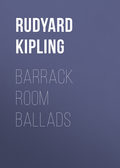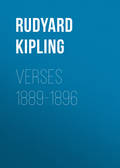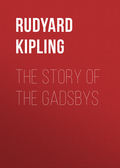
Редьярд Джозеф Киплинг
From Sea to Sea; Letters of Travel
THE CITY OF DREADFUL NIGHT
CHAPTER I
Jan. – Feb., 1888
A REAL LIVE CITY
We are all backwoodsmen and barbarians together – we others dwelling beyond the Ditch, in the outer darkness of the Mofussil. There are no such things as commissioners and heads of departments in the world, and there is only one city in India. Bombay is too green, too pretty, and too stragglesome; and Madras died ever so long ago. Let us take off our hats to Calcutta, the many-sided, the smoky, the magnificent, as we drive in over the Hugli Bridge in the dawn of a still February morning. We have left India behind us at Howrah Station, and now we enter foreign parts. No, not wholly foreign. Say rather too familiar.
All men of a certain age know the feeling of caged irritation – an illustration in the Graphic, a bar of music or the light words of a friend from home may set it ablaze – that comes from the knowledge of our lost heritage of London. At Home they, the other men, our equals, have at their disposal all that Town can supply – the roar of the streets, the lights, the music, the pleasant places, the millions of their own kind, and a wilderness full of pretty, fresh-coloured Englishwomen, theatres and restaurants. It is their right. They accept it as such, and even affect to look upon it with contempt. And we – we have nothing except the few amusements that we painfully build up for ourselves – the dolorous dissipations of gymkhanas where every one knows everybody else, or the chastened intoxication of dances where all engagements are booked, in ink, ten days ahead, and where everybody's antecedents are as patent as his or her method of waltzing. We have been deprived of our inheritance. The men at home are enjoying it all, not knowing how fair and rich it is, and we at the most can only fly westward for a few months and gorge what, properly speaking, should take seven or eight or ten luxurious years. That is the lost heritage of London; and the knowledge of the forfeiture, wilful or forced, comes to most men at times and seasons, and they get cross.
Calcutta holds out false hopes of some return. The dense smoke hangs low, in the chill of the morning, over an ocean of roofs, and, as the city wakes, there goes up to the smoke a deep, full-throated boom of life and motion and humanity. For this reason does he who sees Calcutta for the first time hang joyously out of the ticca-ghari11 and sniff the smoke, and turn his face toward the tumult, saying: "This is, at last, some portion of my heritage returned to me. This is a City. There is life here, and there should be all manner of pleasant things for the having, across the river and under the smoke."
The litany is an expressive one and exactly describes the first emotions of a wandering savage adrift in Calcutta. The eye has lost its sense of proportion, the focus has contracted through overmuch residence in up-country stations – twenty minutes' canter from hospital to parade-ground, you know – and the mind has shrunk with the eye. Both say together, as they take in the sweep of shipping above and below the Hugli Bridge: "Why, this is London! This is the docks. This is Imperial. This is worth coming across India to see!"
Then a distinctly wicked idea takes possession of the mind: "What a divine – what a heavenly place to loot!" This gives place to a much worse devil – that of Conservatism. It seems not only a wrong but a criminal thing to allow natives to have any voice in the control of such a city – adorned, docked, wharfed, fronted, and reclaimed by Englishmen, existing only because England lives, and dependent for its life on England. All India knows of the Calcutta Municipality; but has any one thoroughly investigated the Big Calcutta Stink? There is only one. Benares is fouler in point of concentrated, pent-up muck, and there are local stenches in Peshawar which are stronger than the B. C. S.; but, for diffused, soul-sickening expansiveness, the reek of Calcutta beats both Benares and Peshawar. Bombay cloaks her stenches with a veneer of assafœtida and tobacco; Calcutta is above pretence. There is no tracing back the Calcutta plague to any one source. It is faint, it is sickly, and it is indescribable; but Americans at the Great Eastern Hotel say that it is something like the smell of the Chinese quarter in San Francisco. It is certainly not an Indian smell. It resembles the essence of corruption that has rotted for the second time – the clammy odour of blue slime. And there is no escape from it. It blows across the maidan; it comes in gusts into the corridors of the Great Eastern Hotel; what they are pleased to call the "Palaces of Chowringhi" carry it; it swirls round the Bengal Club; it pours out of by-streets with sickening intensity, and the breeze of the morning is laden with it. It is first found, in spite of the fume of the engines, in Howrah Station. It seems to be worst in the little lanes at the back of Lai Bazar where the drinking-shops are, but it is nearly as bad opposite Government House and in the Public Offices. The thing is intermittent. Six moderately pure mouthfuls of air may be drawn without offence. Then comes the seventh wave and the queasiness of an uncultured stomach. If you live long enough in Calcutta you grow used to it. The regular residents admit the disgrace, but their answer is: "Wait till the wind blows off the Salt Lakes where all the sewage goes, and then you'll smell something." That is their defence! Small wonder that they consider Calcutta is a fit place for a permanent Viceroy. Englishmen who can calmly extenuate one shame by another are capable of asking for anything – and expecting to get it.
If an up-country station holding three thousand troops and twenty civilians owned such a possession as Calcutta does, the Deputy Commissioner or the Cantonment Magistrate would have all the natives off the board of management or decently shovelled into the background until the mess was abated. Then they might come on again and talk of "high-handed oppression" as much as they liked. That stink, to an unprejudiced nose, damns Calcutta as a City of Kings. And, in spite of that stink, they allow, they even encourage, natives to look after the place! The damp, drainage-soaked soil is sick with the teeming life of a hundred years, and the Municipal Board list is choked with the names of natives – men of the breed born in and raised off this surfeited muck-heap! They own property, these amiable Aryans on the Municipal and the Bengal Legislative Council. Launch a proposal to tax them on that property, and they naturally howl. They also howl up-country, but there the halls for mass-meetings are few, and the vernacular papers fewer, and with a strong Secretary and a President whose favour is worth the having and whose wrath is undesirable, men are kept clean despite themselves, and may not poison their neighbours. Why, asks a savage, let them vote at all? They can put up with this filthiness. They cannot have any feelings worth caring a rush for. Let them live quietly and hide away their money under our protection, while we tax them till they know through their purses the measure of their neglect in the past, and when a little of the smell has been abolished, let us bring them back again to talk and take the credit of enlightenment. The better classes own their broughams and barouches; the worse can shoulder an Englishman into the kennel and talk to him as though he were a cook. They can refer to an English lady as an aurat12; they are permitted a freedom – not to put it too coarsely – of speech which, if used by an Englishman toward an Englishman, would end in serious trouble. They are fenced and protected and made inviolate. Surely they might be content with all those things without entering into matters which they cannot, by the nature of their birth, understand.
Now, whether all this genial diatribe be the outcome of an unbiassed mind or the result first of sickness caused by that ferocious stench, and secondly of headache due to day-long smoking to drown the stench, is an open question. Anyway, Calcutta is a fearsome place for a man not educated up to it.
A word of advice to other barbarians. Do not bring a north-country servant into Calcutta. He is sure to get into trouble, because he does not understand the customs of the city. A Punjabi in this place for the first time esteems it his bounden duty to go to the Ajaib-ghar– the Museum. Such an one has gone and is even now returned very angry and troubled in the spirit. "I went to the Museum," says he, "and no one gave me any abuse. I went to the market to buy my food, and then I sat upon a seat. There came an orderly who said, 'Go away, I want to sit here.' I said, 'I am here first.' He said, 'I am a chaprassi!13 get out!' and he hit me. Now that sitting-place was open to all, so I hit him till he wept. He ran away for the Police, and I went away too, for the Police here are all Sahibs. Can I have leave from two o'clock to go and look for that man and hit him again?"
Behold the situation! An unknown city full of smell that makes one long for rest and retirement, and a champing servant, not yet six hours in the stew, who has started a blood-feud with an unknown chaprassi and clamours to go forth to the fray.
Alas! for the lost delusion of the heritage that was to be restored. Let us sleep, let us sleep, and pray that Calcutta may be better to-morrow.
At present it is remarkably like sleeping with a corpse.
CHAPTER II
THE REFLECTIONS OF A SAVAGE
Morning brings counsel. Does Calcutta smell so pestiferously after all? Heavy rain has fallen in the night. She is newly washed, and the clear sunlight shows her at her best. Where, oh where, in all this wilderness of life shall a man go?
The Great Eastern hums with life through all its hundred rooms. Doors slam merrily, and all the nations of the earth run up and down the staircases. This alone is refreshing, because the passers bump you and ask you to stand aside. Fancy finding any place outside the Levée-room where Englishmen are crowded together to this extent! Fancy sitting down seventy strong to tâble d'hôte and with a deafening clatter of knives and forks! Fancy finding a real bar whence drinks may be obtained! and, joy of joys, fancy stepping out of the hotel into the arms of a live, white, helmeted, buttoned, truncheoned Bobby! What would happen if one spoke to this Bobby? Would he be offended? He is not offended. He is affable. He has to patrol the pavement in front of the Great Eastern and to see that the crowding carriages do not jam. Toward a presumably respectable white he behaves as a man and a brother. There is no arrogance, about him. And this is disappointing. Closer inspection shows that he is not a real Bobby after all. He is a Municipal Police Something and his uniform is not correct; at least if they have not changed the dress of the men at Home. But no matter. Later on we will inquire into the Calcutta Bobby, because he is a white man, and has to deal with some of the "toughest" folk that ever set out of malice aforethought to paint Job Charnock's city vermilion. You must not, you cannot cross Old Court House Street without looking carefully to see that you stand no chance of being run over. This is beautiful. There is a steady roar of traffic, cut every two minutes by the deep roll of the trams. The driving is eccentric, not to say bad, but there is the traffic – more than unsophisticated eyes have beheld for a certain number of years. It means business, it means money-making, it means crowded and hurrying life, and it gets into the blood and makes it move. Here be big shops with plate-glass fronts – all displaying the well-known names of firms that we savages only correspond with through the Parcels Post.14 They are all here, as large as life, ready to supply anything you need if you only care to sign. Great is the fascination of being able to obtain a thing on the spot without having to write for a week and wait for a month, and then get something quite different. No wonder pretty ladies, who live anywhere within a reasonable distance, come down to do their shopping personally.
"Look here. If you want to be respectable you mustn't smoke in the streets. Nobody does it." This is advice kindly tendered by a friend in a black coat. There is no Levée or Lieutenant-Governor in sight; but he wears the frock-coat because it is daylight, and he can be seen. He refrains from smoking for the same reason. He admits that Providence built the open air to be smoked in, but he says that "it isn't the thing." This man has a brougham, a remarkably natty little pill-box with a curious wabble about the wheels. He steps into the brougham and puts on – a top-hat, a shiny black "plug."
There was a man up-country once who owned a top-hat. He leased it to amateur theatrical companies for some seasons until the nap wore off. Then he threw it into a tree and wild bees hived in it. Men were wont to come and look at the hat, in its palmy days, for the sake of feeling homesick. It interested all the station, and died with two seers of babul-flower honey in its bosom. But top-hats are not intended to be worn in India. They are as sacred as home letters and old rosebuds. The friend cannot see this. He allows that if he stepped out of his brougham and walked about in the sunshine for ten minutes he would get a bad headache. In half-an-hour he would probably die of sunstroke. He allows all this, but he keeps to his Hat and cannot see why a barbarian is moved to inextinguishable laughter at the sight. Every one who owns a brougham and many people who hire ticca-gharis keep top-hats and black frock-coats. The effect is curious, and at first fills the beholder with surprise.
And now, "let us see the handsome houses where the wealthy nobles dwell." Northerly lies the great human jungle of the native city, stretching from Burra Bazar to Chitpore. That can keep. Southerly is the maidan and Chowringhi. "If you get out into the centre of the maidan you will understand why Calcutta is called the City of Palaces." The travelled American said so at the Great Eastern. There is a short tower, falsely called a "memorial," standing in a waste of soft, sour green. That is as good a place to get to as any other. The size of the maidan takes the heart out of any one accustomed to the "gardens" of up-country, just as they say Newmarket Heath cows a horse accustomed to more a shut-in course. The huge level is studded with brazen statues of eminent gentlemen riding fretful horses on diabolically severe curbs. The expanse dwarfs the statues, dwarfs everything except the frontage of the far-away Chowringhi Road. It is big – it is impressive. There is no escaping the fact. They built houses in the old days when the rupee was two shillings and a penny. Those houses are three-storied, and ornamented with service-staircases like houses in the Hills. They are very close together, and they have garden walls of masonry pierced with a single gate. In their shut-upness they are British. In their spaciousness they are Oriental, but those service-staircases do not look healthy. We will form an amateur sanitary commission and call upon Chowringhi.
A first introduction to the Calcutta durwân or door-keeper is not nice. If he is chewing pân, he does not take the trouble to get rid of his quid. If he is sitting on his cot chewing sugar-cane, he does not think it worth his while to rise. He has to be taught those things, and he cannot understand why he should be reproved. Clearly he is a survival of a played-out system. Providence never intended that any native should be made a concierge more insolent than any of the French variety. The people of Calcutta put a man in a little lodge close to the gate of their house, in order that loafers may be turned away, and the houses protected from theft. The natural result is that the durwân treats everybody whom he does not know as a loafer, has an intimate and vendible knowledge of all the outgoings and incomings in that house, and controls, to a large extent, the nomination of the servants. They say that one of the estimable class is now suing a bank for about three lakhs of rupees.15 Up-country, a Lieutenant-Governor's servant has to work for thirty years before he can retire on seventy thousand rupees of savings. The Calcutta durwân is a great institution. The head and front of his offence is that he will insist upon trying to talk English. How he protects the houses Calcutta only knows. He can be frightened out of his wits by severe speech, and is generally asleep in calling hours. If a rough round of visits be any guide, three times out of seven he is fragrant of drink. So much for the durwân. Now for the houses he guards.
Very pleasant is the sensation of being ushered into a pestiferously stablesome drawing-room. "Does this always happen?" "No, not unless you shut up the room for some time; but if you open the shutters there are other smells. You see the stables and the servants' quarters are close to." People pay five hundred a month for half-a-dozen rooms filled with scents of this kind. They make no complaint. When they think the honour of the city is at stake they say defiantly: "Yes, but you must remember we're a metropolis. We are crowded here. We have no room. We aren't like your little stations." Chowringhi is a stately place full of sumptuous houses, but it is best to look at it hastily. Stop to consider for a moment what the cramped compounds, the black soaked soil, the netted intricacies of the service-staircases, the packed stables, the seethment of human life round the durwâns' lodges and the curious arrangement of little open drains mean, and you will call it a whited sepulchre.
Men living in expensive tenements suffer from chronic sore throat, and will tell you cheerily that "we've got typhoid in Calcutta now." Is the pest ever out of it? Everything seems to be built with a view to its comfort. It can lodge comfortably on roofs, climb along from the gutter-pipe to piazza, or rise from sink to verandah and thence to the topmost story. But Calcutta says that all is sound and produces figures to prove it; at the same time admitting that healthy cut flesh will not readily heal. Further evidence may be dispensed with.
Here come pouring down Park Street on the maidân a rush of broughams, neat buggies, the lightest of gigs, trim office brownberrys, shining victorias, and a sprinkling of veritable hansom cabs. In the broughams sit men in top-hats. In the other carts, young men, all very much alike, and all immaculately turned out. A fresh stream from Chowringhi joins the Park Street detachment, and the two together stream away across the maidân toward the business quarter of the city. This is Calcutta going to office – the civilians to the Government Buildings and the young men to their firms and their blocks and their wharves. Here one sees that Calcutta has the best turn-out in the Empire. Horses and traps alike are enviably perfect, and – mark the touchstone of civilization —the lamps are in their sockets! The country-bred is a rare beast here; his place is taken by the Waler,16 and the Waler, though a ruffian at heart, can be made to look like a gentleman. It would be indecorous to applaud the winking harness, the perfectly lacquered panels, and the liveried saises. They show well in the outwardly fair roads shadowed by the Palaces.
How many sections of the complex society of the place do the carts carry? First, the Bengal Civilian who goes to Writers' Buildings and sits in a perfect office and speaks flippantly of "sending things to India," meaning thereby referring matters to the Supreme Government. He is a great person, and his mouth is full of promotion-and-appointment "shop." Generally he is referred to as a "rising man." Calcutta seems full of "rising men." Secondly, the Government of India man, who wears a familiar Simla face, rents a flat when he is not up in the Hills, and is rational on the subject of the drawbacks of Calcutta. Thirdly, the man of the "firms," the pure non-official who fights under the banner of one of the great houses of the City, or for his own hand in a neat office, or dashes about Clive Street in a brougham doing "share work" or something of the kind. He fears not "Bengal," nor regards he "India." He swears impartially at both when their actions interfere with his operations. His "shop" is quite unintelligible. He is like the English city man with the chill off, lives well and entertains hospitably. In the old days he was greater than he is now, but still he bulks large. He is rational in so far that he will help the abuse of the Municipality, but womanish in his insistence on the excellencies of Calcutta. Over and above these who are hurrying to work are the various brigades, squads, and detachments of the other interests. But they are sets and not sections, and revolve round Belvedere, Government House, and Fort William. Simla and Darjeeling claim them in the hot weather. Let them go. They wear top-hats and frock-coats.
It is time to escape from Chowringhi Road and get among the long-shore folk, who have no prejudices against tobacco, and who all use very much the same sort of hat.






